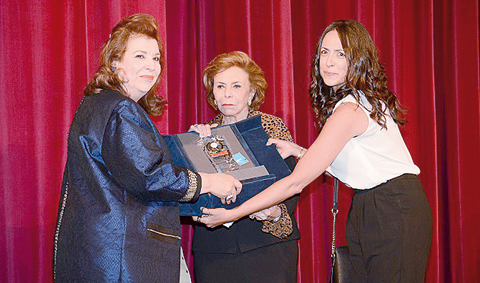'Honoring linked to being companion of a man who loved Egypt'
 CAIRO: Director General of the Arab Women Organization Ambassador Mirvat Al-Tellawi (center) honors Fawziya Al-Rifae (left).
CAIRO: Director General of the Arab Women Organization Ambassador Mirvat Al-Tellawi (center) honors Fawziya Al-Rifae (left).KUWAIT: Director General of the Arab Women Organization Mirvat Al-Tellawi honored the widow of the late Nasser Mohammad Al-Kharafi, Fawziya Al-Rifae, along with several other pioneering women for their great contributions in serving their countries and advancing the Arab world as a whole. Among them was ambassador Haifa Abu Ghazalah, Assistant Secretary General, Director of the Information and Communications Sector at the Arab League; Nadiya Abdu, the first woman to serve as governor in Egypt; and actress Yasmeen Sabri.
President of the Egypt Lovers Society presented Fawziya Al-Rifae with an artwork of Al-Moez Street. The ceremony was held at the Egypt University for Technology's Opera House in October 6 City, and was attended by a large number of ministers, ambassadors, media persons and artists. Fawziya Al-Rifae gave a brief speech prior to receiving a plaque, during which she thanked the Arab Women Organization that witnessed a lot of advancement under the management of Ambassador Mirvat Al-Tellawi for the honor, "which pleased me and added to my colleagues' and my motives for more work to develop Arab women's affairs."
Mutual love
She said her honoring is linked to being the companion of a man who loved Egypt very much, and the Egyptians gave him back the same love - he is the late Nasser Mohammad Al-Kharafi, who used to consider Egypt as the second home of all Arabs, and the evidence of this love is that Almighty Allah chose his death in Egypt, which was the last thing he saw before passing away in April 2011.
Fawziya Al-Rifae said the late Nasser Al-Kharafi was not just a husband or soul mate - rather he was much more than that - he was a mentor. "He taught me that good deeds are the greatest of human duties on earth. He taught me that money means nothing unless it is transformed into real value that we present to serve the society we live in," she said.
She said that Nasser Al-Kharafi use to believe money is from Allah, so it should be used for construction and developing the earth that Allah created and asked us to inhabit. He used to say that the best moment for him was to see hands building to produce something we lack and provide dignified living for Arabs and humanity. She said he taught her that the needs of the individual human being are very limited, while the needs of societies and countries do not stop for the sake of building and development.
She concluded her speech by saying: "He taught me a lot, but the most important lesson I learnt from my late companion Nasser Al-Kharafi was the love of Egypt and understanding the secrets of its greatness. The happiest moment in his life was the opening of a new project in any area of Egypt, which he made the main aim of Al-Kharafi Group investments, as a continuation of what his late father Mohammad Abdelmohsen Al-Kharafi started nearly 90 years ago, as it is the strongest pillar of Arab countries."
20 million refugees
The ceremony began with a speech by Ambassador Mirvat Al-Tellawy, who spoke about the phenomenon of refugee and displaced women around the world, and how 80 percent of refugees' responsibilities are borne by women and children. She added that there are 20 million Arab women refugees among the 60 million around the world. Tellawy said the woman's organization leads the effort of supporting the refugees and displaced materially and morally. She then spoke about the women that were honored and their contributions, pointing out the important role the late Nasser Mohammad Al-Kharafi played with Kuwaiti investments in Egypt over the past 40 years.
Then a speech was delivered by Egyptian Immigration and Egyptians' Affairs Minister Ambassador Nabila Makram Obaid on behalf of Egypt's Prime Minister Shareef Ismail, in which she lauded the efforts of Tellawy through the Arab Women's Organization in supporting Arab women refugees and the displaced. She expressed hopes that other countries will deal with refugees as Egypt does, which hosts refugees and presents them support similar to Egyptian citizens with regards to education, health and labor, and refuses to establish camps like other countries. Plaques were then handed to the honorees by Tellawy, followed by a performance by singers Hani Shaker and Yasmeen Al-Elwani with conductor Saleem Sahab. The proceeds were donated to refugees.










